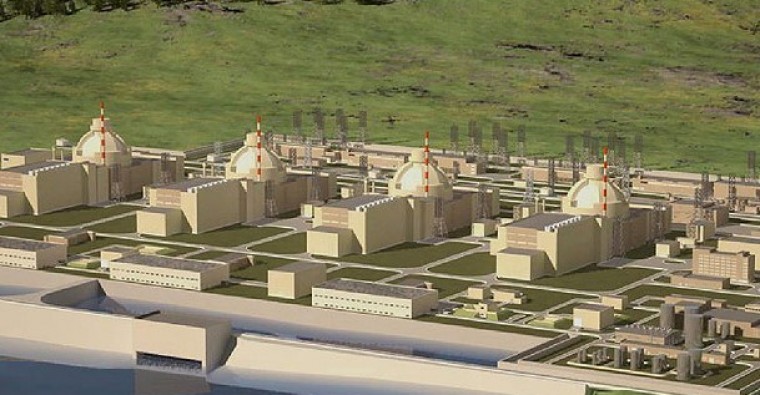
Court decision puts Norway on the hook for massive CO₂ Storage build-out
A ruling by the European Free Trade Association Court that Norway’s continental shelf falls under the European Economic Area Agreement could dramatic...
News

Publish date: May 14, 2019
News
The Turkish nuclear regulator has repeatedly found cracks in the foundation of the Russian-built Akkuyu nuclear power plant, a report in a government-run Ankara-based newspaper has said, raising concerns over the safety of the country’s first atomic energy station.
Yet Rosatom, Russia’s state nuclear corporation, dismissed those worries, saying that the cracks had occurred in early testing stages, and that the foundation concrete for the plant’s first reactor had been re-poured without impacting construction deadlines.
But the origins of the report suggest it may have been motivated by political rather than environmental or technical concerns.
Haber Turk, the paper that initially broke the news of the cracks, has close ties to Recep Tayyip Erdogan, Turkey’s authoritarian president. According to experts, there’s little chance that members of Erdogan’s government hadn’t approved the newspaper’s reporting on the cracks beforehand.
In fact, according to the RBC Russian business newswire – a Russian outlet with a reputation for being independent publ – the cracks to which Haber Turk referred in its article last week had been resolved by Rosatom a year ago.
The Akkuyu plant, which is slated to operate four of Rosatom’s VVER-1200-type reactors, has long ridden the ebb and flow of political tides between Turkey and Russia. The plant was nearly scrapped in 2014 when Turkey mistakenly shot down a Russian fighter jet. But Russian President Vladimir Putin put the plant back on track, saying that prospective commercial gains outweighed political tensions.
Nonetheless, Anakara has been squeamish about the price of the project, and is having trouble providing the necessary investment to hold up its side of the bargain.
The first unit of the plant is due to come online in 2023 – a deadline Rosatom says it is holding to – to mark the Turkish Republic’s 100th anniversary. The remaining three are scheduled to follow by 2025. When completed, the plant will generate 4,800 watts of electricity – about 10 percent of Turkey’s total energy needs.
The cost of the plant, per the deal Rosatom and Ankara struck in 2010, is expected to be $20 billion. Rosatom has pledged to finance 51 percent of the build, with the other 49 percent coming from Turkish investors.
But Turkish investors have been hard to sustain. Until 2018, two Turkish investment firms called Kolin and Kalyon backed Ankara’s stake in the plant. But they backed out in February of that year, citing their failure to agree with Rosatom on a number of project’s “commercial conditions” – and casting Akkuyu’s scheduled completion date into doubt.
Rosatom brushed off those concerns, claiming the following month that it could afford to build the plant by itself. Yet according to reports last month from the Hurriyet Daily, another state-sponsored Turkish news agency, Rosatom has not yet given up the search for local investors to finance the outstanding 49 percent.
Where that leaves the ongoing construction at the plant is uncertain. The basemat, or foundation, for the first reactor has been completed, according to Turkish and Russian media, and workers are expected make progress on the second reactor in coming months.
But Turkish media is still carrying pieces opposing what they say will be inflated prices for the electricity Akkuyu will produce. According to RBC daily, they may have a point.
Under Rosatom’s agreement with Turkey, the electricity Akkuyu generates for its first 15 years must be priced at 12 US cents per kilowatt-hour in order for Rosatom to recoup its investment. But the electricity prices at a plant Rosatom plans to build for Egypt would be less than half what Turkey will be charged for its kilowatt-hours, the Turkish state-sponsored Ahwal News reported.
Indeed, as the outlet recounted with outrage, world average electricity prices are closer to the 5.3 US cents per kilowatt-hour Rosatom plans to charge customers of its as-yet-to-be-built El Dabba nuclear plant in Egypt.
Whether Ankara will be able to renegotiate the terms of Akkuyu’s electricity pricing remains to be seen. But the tea leaves it is leaving in its official media indicate it is anxious to do so.

A ruling by the European Free Trade Association Court that Norway’s continental shelf falls under the European Economic Area Agreement could dramatic...

Bellona held a seminar on countering Russian disinformation in the Arctic at the Arctic Frontiers international conference in Norway

Our December Nuclear Digest, reported by Bellona’s Environmental Transparency Center, is out now. Here’s a quick taste of three nuclear issues arisin...

Bellona has launched the Oslofjord Kelp Park, a pilot kelp cultivation facility outside Slemmestad, about 30 kilometers southwest of Oslo, aimed at r...